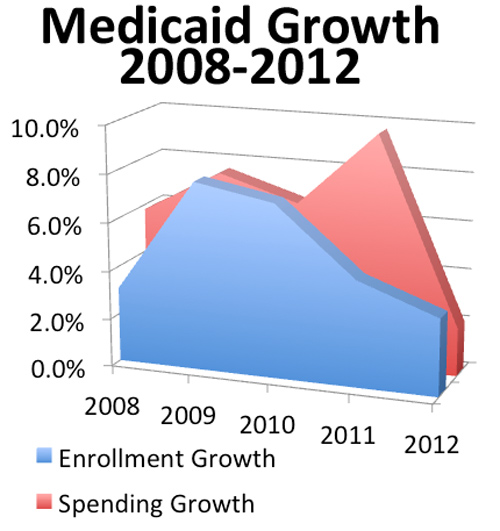Growth in total Medicaid spending and enrollment slowed substantially in FY 2012, a report by the Kaiser Family Foundation found, and relatively slow growth is expected to continue in FY 2013.
Cost pressure and cost containment were still dominant themes, according to the report, but states were also able to consider program changes, payment and delivery system reforms and continue efforts to re-orient long-term care programs to community-based care models. Eligibility rules for Medicaid remained stable due to the maintenance of eligibility (MOE) protections that were part of health reform legislation, and a number of states adopted targeted eligibility expansions or simplified enrollment procedures.
States are also preparing for the new role for Medicaid in the implementation of the Affordable Care Act (ACA). Under the June 2012 Supreme Court ruling, the Secretary’s authority to enforce the ACA Medicaid expansion requirement is limited, and state policy makers will decide whether or when to implement the Medicaid expansion.
The findings in this report are drawn from the 12th consecutive year of the Kaiser Commission on Medicaid and the Uninsured (KCMU) and Health Management Associates (HMA) budget survey of Medicaid officials in all 50 states and the District of Columbia. This survey reports on trends in Medicaid spending, enrollment and policy initiatives for FY 2012 and FY 2013. The report describes policy changes in reimbursement, eligibility, benefits, delivery systems and long-term care, as well as detailed appendices with state-by-state information, and a more in-depth look through four state-specific case studies of the Medicaid budget and policy decisions in Massachusetts, Ohio, Oregon and Texas.





![[Image by creator from ]](/media/images/2015-04-cpf-report-training-key-component-of-s.max-80x80_F7Jisej.png)


![[Image by creator from ]](/media/images/Collections_Staffing_Full_Cover_Thumbnail.max-80x80.jpg)
![Report cover reads One Conversation Multiple Channels AI-powered Multichannel Outreach from Skit.ai [Image by creator from ]](/media/images/Skit.ai_Landing_Page__Whitepaper_.max-80x80.png)
![Report cover reads Bad Debt Rising New ebook Finvi [Image by creator from ]](/media/images/Finvi_Bad_Debt_Rising_WP.max-80x80.png)
![Report cover reads Seizing the Opportunity in Uncertain Times: The Third-Party Collections Industry in 2023 by TransUnion, prepared by datos insights [Image by creator from ]](/media/images/TU_Survey_Report_12-23_Cover.max-80x80.png)
![[Image by creator from ]](/media/images/Skit_Banner_.max-80x80.jpg)
![Whitepaper cover reads: Navigating Collections Licensing: How to Reduce Financial, Legal, and Regulatory Exposure w/ Cornerstone company logo [Image by creator from ]](/media/images/Navigating_Collections_Licensing_How_to_Reduce.max-80x80.png)